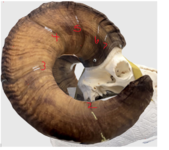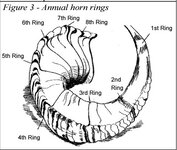What is it about that particular ring that you are able to conclude it is not a true growth ring? I'm just trying to understand what to look for.Though a groove completely circling the horn is a characteristic of a true growth ring, it is not unique to true growth grooves. Some false growth grooves also show a strong groove encircling the horn.
You are using an out of date browser. It may not display this or other websites correctly.
You should upgrade or use an alternative browser.
You should upgrade or use an alternative browser.
Older broomed Dall
- Thread starter wantj43
- Start date
- Thread Starter
- #22
The first thing that stands out is how much weaker the groove is compared to those on either side. The groove in question appears to be part of a pattern that is repeated in several previous growth segments.
I can annotate an image if it would help.
I can annotate an image if it would help.
The first thing that stands out is how much weaker the groove is compared to those on either side. The groove in question appears to be part of a pattern that is repeated in several previous growth segments.
I can annotate an image if it would help.
So are you calling the first marked annuli in from the tip his 3rd year annuli or 2nd year annuli? I feel like the root of most confusion when aging rams in what is year 2 and what is year 3. Next most argued about is annuli near the base, what is and what isn't an annuli there.
Very cool exercise and thanks for posting.
- Thread Starter
- #24
The first ring shows all the characteristics of the ring formed at 18 months. The next ring is consistant with the ring formed at 30 months.So are you calling the first marked annuli in from the tip his 3rd year annuli or 2nd year annuli? I feel like the root of most confusion when aging rams in what is year 2 and what is year 3. Next most argued about is annuli near the base, what is and what isn't an annuli there.
Very cool exercise and thanks for posting.
Hope this helps
The first ring shows all the characteristics of the ring formed at 18 months. The next ring is consistant with the ring formed at 30 months.
Hope this helps
Yes that does help.
What are the characteristics that you look for to differentiate between these two annuli.
One of the methods for aging that I think a lot are taught is to start counting from the tip to the base and to count the first well defined annuli as year 3. I know of several instances of hunters and bios having differing opinion on which annuli is the first well defined annuli and thus having differing opinions on the age of the animal by one year. This can obviously be problematic when the difference is between 7 and 8 on a less than full curl ram with both tips intact.
So the 18 month ring is based on a fall season date but considered as lamb tip or one year? In other words, the annuli noted as 2 below is the 30 month ring that you are referring to?The first ring shows all the characteristics of the ring formed at 18 months. The next ring is consistant with the ring formed at 30 months.
Hope this helps

- Thread Starter
- #28
Counting the ring formed 18 months as “2” assumes the animal dies after June of the following year. If the animal dies in say April the age would be “1” though in its second year of life. An animal with eight annuli is seven until the next May or June. Since most animals harvested in the fall the total count of rings is the actual age.I read Joe's response as the annuli marked 2 in your photo was the 18mo, and annuli 3 is the 30mo.
I understand that annuli measure periods of growth and not actual age to the month. That having been said, most tend to speak generally and equate an annuli to a year of life for the sheep. The language in the regs reflects and directs the same.
"A ram at least 8 years old as determined by counting annual horn rings and segments (Figure 3). If a ram’s horns are not legal based on degree of curl or broken tips, you are responsible for counting at least 8 true annuli before attempting to take the ram."
So as not to conflate true age with annuli, my original question should have used "annuli" instead of "year."
To rephrase, is the first highlighted annuli labeled with a red 2 in smg's annotated photo the 2nd or 3rd "true annuli" for the purposes of complying with the "8 true annuli" requirement?

The drawing from the regs is consistent with my understanding and application of annuli counting, which is again that the first well-defined annuli is the 3rd. The marked photo and, it seems like the opinion of several sealers in the last few years, is that the first well defined annuli is the 2nd.
From the tip you should see a lamb trip lump/annuli formed during the first winter. Then a faint, poorly defined 2nd annuli for winter #2 as illustrated above. Then the first well-defined annuli formed during winter 3.
"A ram at least 8 years old as determined by counting annual horn rings and segments (Figure 3). If a ram’s horns are not legal based on degree of curl or broken tips, you are responsible for counting at least 8 true annuli before attempting to take the ram."
So as not to conflate true age with annuli, my original question should have used "annuli" instead of "year."
To rephrase, is the first highlighted annuli labeled with a red 2 in smg's annotated photo the 2nd or 3rd "true annuli" for the purposes of complying with the "8 true annuli" requirement?

The drawing from the regs is consistent with my understanding and application of annuli counting, which is again that the first well-defined annuli is the 3rd. The marked photo and, it seems like the opinion of several sealers in the last few years, is that the first well defined annuli is the 2nd.
From the tip you should see a lamb trip lump/annuli formed during the first winter. Then a faint, poorly defined 2nd annuli for winter #2 as illustrated above. Then the first well-defined annuli formed during winter 3.
Last edited:
- Thread Starter
- #30
On this set of horns the first well defined groove shows all the characteristics of an “18” month (2 year) growth ring.I understand that annuli measure periods of growth and not actual age to the month. That having been said, most tend to speak generally and equate an annuli to a year of life for the sheep. The language in the regs reflects and directs the same.
"A ram at least 8 years old as determined by counting annual horn rings and segments (Figure 3). If a ram’s horns are not legal based on degree of curl or broken tips, you are responsible for counting at least 8 true annuli before attempting to take the ram."
So as not to conflate true age with annuli, my original question should have used "annuli" instead of "year."
To rephrase, is the first highlighted annuli labeled with a red 2 in smg's annotated photo the 2nd or 3rd "true annuli" for the purposes of complying with the "8 true annuli" requirement?
View attachment 523645
The drawing from the regs is consistent with my understanding and application of annuli counting, which is again that the first well-defined annuli is the 3rd. The marked photo and, it seems like the opinion of several sealers in the last few years, is that the first well defined annuli is the 2nd.
From the tip you should see a lamb trip lump/annuli formed during the first winter. Then a faint, poorly defined 2nd annuli for winter #2 as illustrated above. Then the first well-defined annuli formed during winter 3.
cbeard64
WKR
Great thread. Learning a lot.
The main thing is that watching knowledgeable and experienced guys discuss the ins and outs of aging rams reinforces one thing: I am NEVER going to shoot a ram based on growth rings alone if there’s even a hint of a possibility the ram might be “on the edge”.
The main thing is that watching knowledgeable and experienced guys discuss the ins and outs of aging rams reinforces one thing: I am NEVER going to shoot a ram based on growth rings alone if there’s even a hint of a possibility the ram might be “on the edge”.
Great thread. Learning a lot.
The main thing is that watching knowledgeable and experienced guys discuss the ins and outs of aging rams reinforces one thing: I am NEVER going to shoot a ram based on growth rings alone if there’s even a hint of a possibility the ram might be “on the edge”.
Agreed. Make em legal twice!
On this set of horns the first well defined groove shows all the characteristics of an “18” month (2 year) growth ring.
Without the tips intact, what are you looking at on this set of horns to make that determination?
- Thread Starter
- #34
The groove formed at 18 months tends to be oval shaped on the butting surface; shallow and smooth while the 30 months groove usually forms a notch on the upper part of the outer surface and pronounced bump on the inner surface of butting edge and the butting surface is usually flat.Without the tips intact, what are you looking at on this set of horns to make that determination?
Last edited:
Mykolaivka887
WKR
- Joined
- Jan 15, 2022
- Messages
- 1,767
I agree - 8 yrsI'd guess that ram at 8.
Similar threads
Featured Video
Stats
Latest Articles
-
WE WON!
-
Mule Deer Rut Update & Buck Story
-
Sitka Gear HyperDown Sleeping Bag Review
-
TT#42 Mark Denham with Outdoorsmans history and innovations.
-
Kryptek Traverse Merino Review
-
First Lite 308 Pant Review
-
Argali Selway 6P Tent Review
-
AGC Kobuk 2800 Backpack Review
-
Hunting The Leaf-off Window
-
TT#41 Jordan Budd’s Tips on Finding and Killing the Big One
